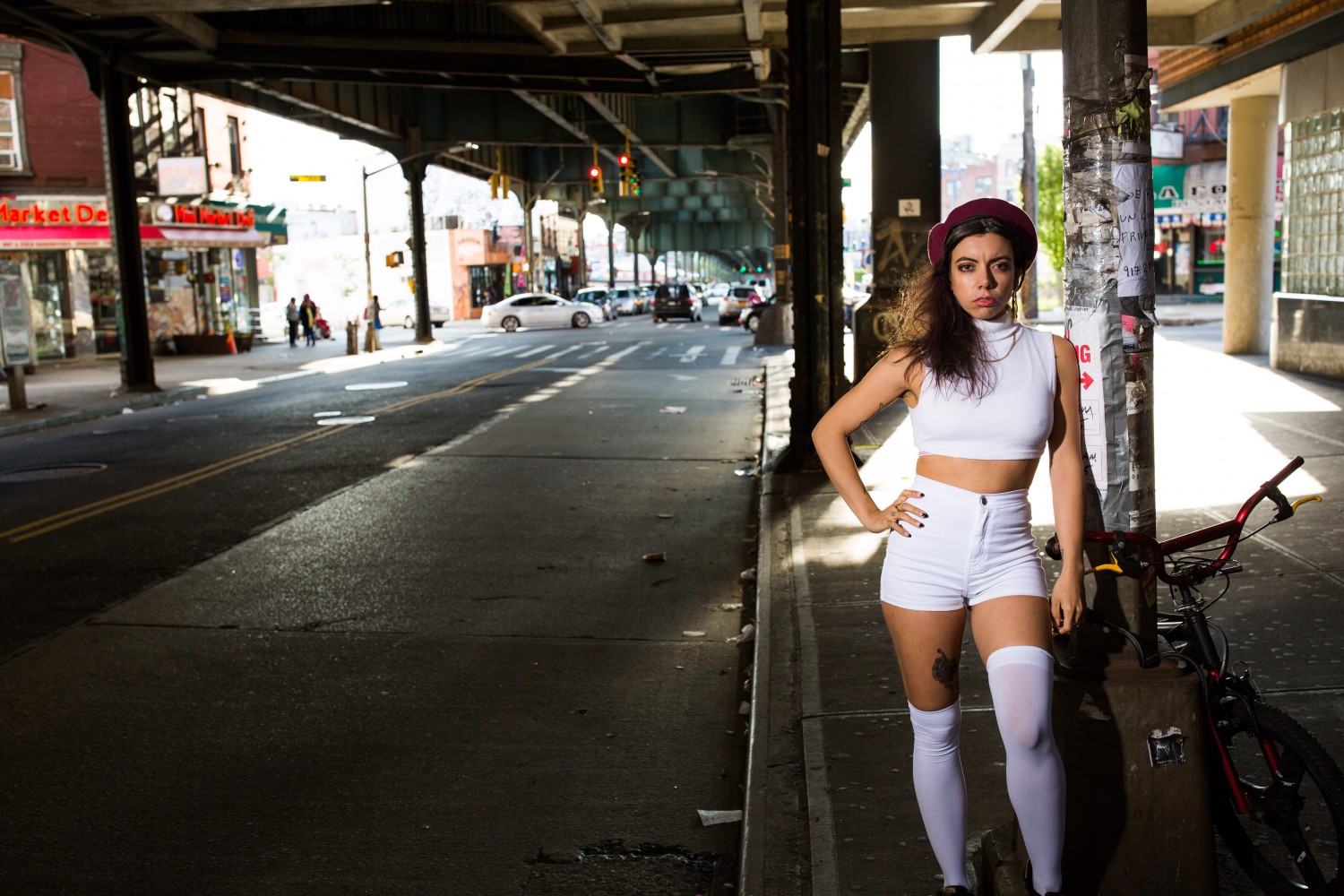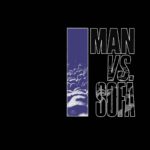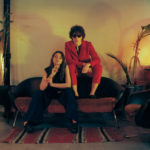Hurray For The Riff Raff‘s staggeringly brilliant new album, The Navigator, is unleashed to the world next month. God Is In The TV caught up with Alynda Segarra: singer, multi-instrumentalist and songwriter extraordinaire, to discuss the band’s most essential releases.
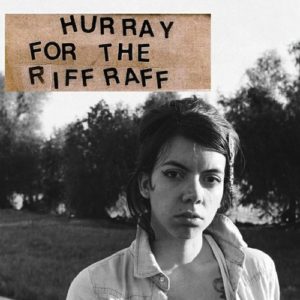
HURRAY FOR THE RIFF RAFF (2011)
You self released two albums (2008’s It Don’t Mean I Love You and the following year’s Young Blood Blues), but then cherry picked your favourite tracks from those two records for this, your first release on Loose Music. You’d been performing as part of the Dead Man Street Orchestra up until this point, right?
Alynda: Yeah, and it was one of the funnest times of my life – it was such a circus and nothing was ever planned! We were just kids really and it was one of the purest, most childlike times. But then it just started to separate and everyone started making their own plans, so I thought “Well, I gotta figure out my plans and work out what I’m gonna do.” I formed the band in San Francisco and those first two records were a lot of very personal and therapeutic things I had to get out of my system.
Did you have a specific vision for how you wanted the band to sound?
I think I was going along with what was hip at that moment. I played acoustic music, and because I didn’t have a place to stay, my music started to reflect exactly that. It was all very gypsy and street sounding. I just sat down and whatever came out I decided to just roll with it. One thing I was sure about though, was that I wanted to do this from a feminist standpoint, and to stand up for people who are hurt by patriarchy. I wanted to make music that could be healing for people.
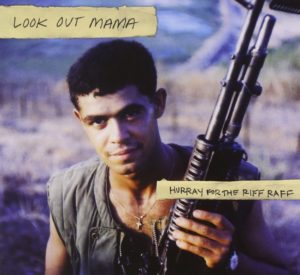
LOOK OUT MAMA (2012)
This album features a photo of your dad, who survived Vietnam, on the sleeve. How much would you say his experience informed your songwriting?
Oh, wow. I wish I could give you a percentage, but it is just so big. At that point, I was still trying to heal my relationship with him after running away from home as a teenager. It was so hard for him to try to understand why I left, but this was a really big point in my and his relationship. He was really surprised – “Why did you put me on the cover?!” But you know, he was just so open about war. He told us all about the long lasting effects, the trauma, and how it was usually the poor folk who ended up risking and losing their lives. He never let us think that war was any different and he helped me form a critical mind.
This album is where it becomes apparent how much of your music reflects the image of something of a troubadour, perhaps a lonesome one. How much of your stuff is autobiographical?
Oh yeah, a lot of it is definitely autobiographical. I’ve always loved moving, the feeling of being in motion. The point is I love heading somewhere. Whenever I got somewhere though, I always wanted to go on another trip straight away! My last album was such a big step for me as a writer, as it had more of a story to it, and I think that’s because only travelling makes me a patriot in a way that makes me more helpful, whether I was born there or not.
You do a fantastic job here of sounding vibrant and enthusiastic one minute, and then world weary the next. Ever considered acting?
(Laughs) Actually when I was little, that’s what I really wanted to become! I went to a public school and they always used to put on three rotating shows while I was there: one was about World War One, one was about slavery and the other was about the holocaust – really cheerful stuff! But my teacher there taught me so much about the world and I loved tapping into different moments. I don’t think I’d want to act now though, I would hate to deal with all the bullshit that comes with being a celebrity on that scale.
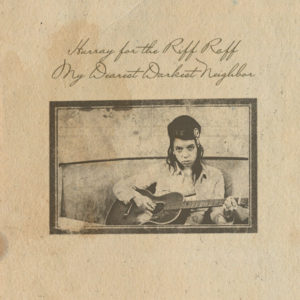
MY DEAREST DARKEST NEIGHBOR (2013)
This was largely a covers album, a limited edition one featuring tracks by the likes of Gillian Welch, Lead Belly and Joni Mitchell amongst others. What was the idea behind it?
I think I was definitely still going through a kind of angsty stage at that point, and I was choosing songs that I felt I had a lot to learn from, whether it was the story telling or the finger picking, and I was really trying to study as many different instruments as I could. I was trying to learn from, mostly, the great American folk singer/songwriters of our time. I think the Billie Holiday one (‘Fine And Mellow‘) is my favourite, with its Big Bill Broonzy guitar part. I never play it though as it’s so hard to get right!
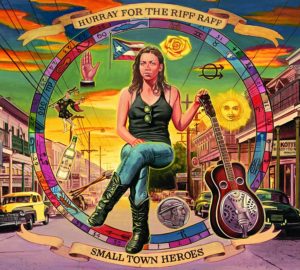
SMALL TOWN HEROES (2014)
I read an Amazon review of Small Town Heroes which said it was a little like “watching a friend drunkenly trying to smile whilst crying…“
Wow! That sounds like my early twenties! That’s amazing, and very well representative of the album. Until now, I’d been kinda stuck in the sadness, still feeling a little bleak, but this is where I started to experiment a little, and asked myself “Now, can I write this kind of song? Can I write that kind of song?”
‘The Body Electric‘ is arguably the centrepiece of this one…
That came to me because I was at a show where there was a young man playing a guitar, and he was playing like a “murder ballad” where he was talking about shooting down his woman. At that time there was a lot of talk going on about police brutality and gun restrictions, and while I was listening I thought “This is bullshit!” – you know, rap music gets criticised a lot for its supposedly misogynistic lyrics, but here we have a white man singing about shooting his girlfriend for cheating, and nobody says a word! It made me really angry, I mean ok, this girl cheated on you, get over it! Shooting her is so irrational and I was like “Do you even know what you’re saying?!” I just think people should take more responsible for being violent, you know? It’s like when a black man gets shot when he has no gun just because he “looks dangerous,” or women who get told “he attacked you because you were dressed inappropriately.” Total bullshit.
This was the album that brought you most prominently into the public eye. Did you notice a significant shift in your own lifestyle because of that?
Mainly in the way we tour, yeah. We’re still in a van, not a tour bus, but we’re a lot more comfortable these days. Up until Small Town Heroes, we were still sleeping at people’s houses we’d met on tour. Our audiences have grown, and we’ve definitely seen a shift in the press for our upcoming album and the last one. It feels like this one was the beginning of me being taken more seriously as an artist and songwriter.
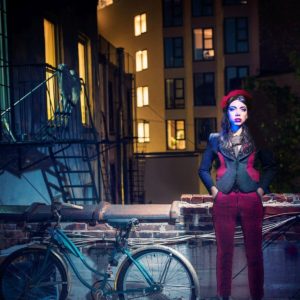
THE NAVIGATOR (2017)
This is Hurray For The Riff Raff’s remarkable latest album, and has instantly become one of my favourite records of the entire decade, let alone the year. Clearly, it is a nod towards those oppressed in the most savage manner throughout history…
I always felt a kind of kinship with them, you know, particularly an anger in the way they were treated that I’ve had since I was a little kid. I didn’t know how to express it then, so this was all about getting in touch with my ancestry. There were so many questions burning in my mind and, I don’t know if it’s my age, but I felt like I wanted to try to make something that felt like I was healing my ancestors’ wounds, while at the same time trying to make space for future generations.
Despite the depth of its subject matter, there is a lot of positivity emanating from its pores. Was it hard to find that balance?
I struggle with it a lot because things right now feel so bleak. There’s so much blind hatred going on in the world right now that it’s hard to find the positives. But what gets me through more and more is understanding oppressed peoples of all colours, and what I’ve found is this – people are afraid of us, of minorities, but not because we’re dangerous. No, they’re afraid of us because of our power, and our unwillingness to give up. I come from a Puerto Rican family and we are a very proud people, with a real richness of culture. We are strong, and that frightens people.
Perhaps the most stirring moment of the whole thing comes in the form of ‘Pa’lante‘. It sounds emotionally draining to sing. Was it?
It really was! It was a very emotional day. I was supposed to be recording a song which didn’t even make it onto the final cut of the album, and when we came to record this one, I was like a teenage girl, crying so much that our producer, Paul (Butler) said, “just go for a walk!” I felt like I wasn’t reaching my emotions, but luckily we were right near the beach, so I could clear my head. So when I came back, I sat down at this Yamaha electric piano, and I’d recently been watching some footage of John Lennon performing the song ‘Mother‘. So I thought “Right, maybe it’s time to do some primal screaming.” I worried whether it was going to sound stupid but it all just started coming out. We kept the end part separate and when I came to do that, Paul said, “Ok, everybody get out of the room, Alynda needs to do this bit alone.” When we listened back afterwards I felt so proud. Paul was so good at pressing me and at the end, I cried again because I was so relieved. This is the part of the album where the past, future and present all come together like they’re all talking to each other. And maybe that’s what we need to do more of. We all need to work together.
Photo: Sarrah Danziger

